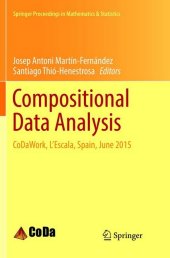 Neuerscheinungen 2018Stand: 2020-02-01 |
Schnellsuche
ISBN/Stichwort/Autor
|
Herderstraße 10
10625 Berlin
Tel.: 030 315 714 16
Fax 030 315 714 14
info@buchspektrum.de |

Josep Antoni Martín-Fernández, Santiago Thió-Henestrosa
(Beteiligte)
Compositional Data Analysis
CoDaWork, L´Escala, Spain, June 2015
Herausgegeben von Martín-Fernández, Josep Antoni; Thió-Henestrosa, Santiago
Softcover reprint of the original 1st ed. 2016. 2018. x, 209 S. 13 SW-Abb., 58 Farbabb. 235 mm
Verlag/Jahr: SPRINGER, BERLIN; SPRINGER INTERNATIONAL PUBLISHING 2018
ISBN: 3-319-83141-0 (3319831410)
Neue ISBN: 978-3-319-83141-1 (9783319831411)
Preis und Lieferzeit: Bitte klicken
The authoritative contributions gathered in this volume reflect the state of the art in compositional data analysis (CoDa). The respective chapters cover all aspects of CoDa, ranging from mathematical theory, statistical methods and techniques to its broad range of applications in geochemistry, the life sciences and other disciplines. The selected and peer-reviewed papers were originally presented at the 6th International Workshop on Compositional Data Analysis, CoDaWork 2015, held in L´Escala (Girona), Spain.
Compositional data is defined as vectors of positive components and constant sum, and, more generally, all those vectors representing parts of a whole which only carry relative information. Examples of compositional data can be found in many different fields such as geology, chemistry, economics, medicine, ecology and sociology. As most of the classical statistical techniques are incoherent on compositions, in the 1980s John Aitchison proposed the log-ratio approach to CoDa. This became the foundation of modern CoDa, which is now based on a specific geometric structure for the simplex, an appropriate representation of the sample space of compositional data.
The International Workshops on Compositional Data Analysis offer a vital discussion forum for researchers and practitioners concerned with the statistical treatment and modelling of compositional data or other constrained data sets and the interpretation of models and their applications. The goal of the workshops is to summarize and share recent developments, and to identify important lines of future research.
Compositional Analysis of Species Composition - Pawlowsky-Glahn, Monreal-Pawlowsky, Egozcue.- Optimising Archaeologic Ceramics h-XRF Analyses - Bergman, Lindahl.- Relationship Between Popularity of Key Words on the Google Browser and the Evolution of Worldwide Financial Indexes - Ortells, Egozcue, Ortego, Garola.- Advances in Integrating Isotopic Data with Compositional Data Analysis: Applications for Deep Formation Brine Chemistry - Blondes, Engle, Geboy.- Space-time Compositional fields: An Introduction to Simplicial Partial Differential Operators - Jarauta-Bragulat, Egozcue.- A Compositional Approach to Allele Sharing Analysis - Galvan, Graffelman.- An Application of the Isometric Log-ratio Transformation in Relatedness Research.- Graffelman, Galvan.- Diagnostic Tools and Model Selection in Scaled-Dirichlet Regression - Monti, Mateu-Figueras, Pawlowsky-Glahn, Egozcue.- Toward the Concept of Background/Baseline Compositions: A Practicable Path? - Buccianti, Nisi, Raco.- Multi Element Geochemical Modelling for Mine Planning: Case Studies from Epithermal Gold Deposits - Caciagli, Warman.- Recognizing and Validating Structural Processes in Geochemical Data - Grunsky, Kjarsgaard.


